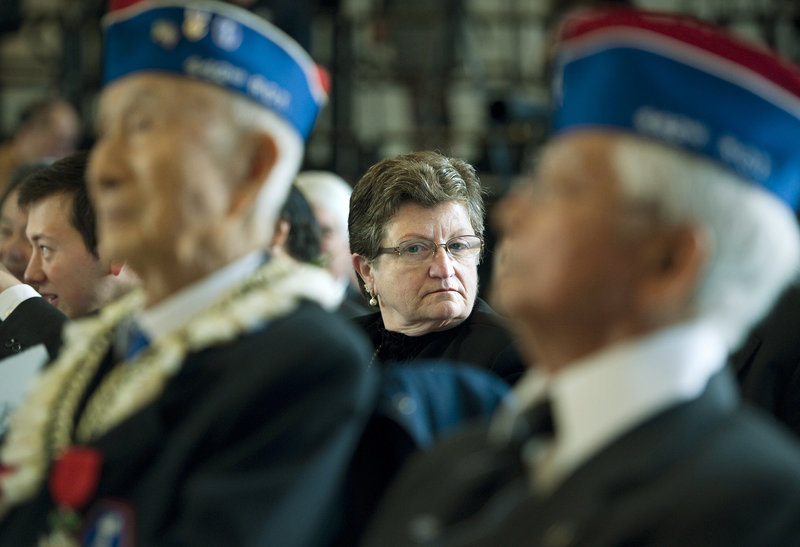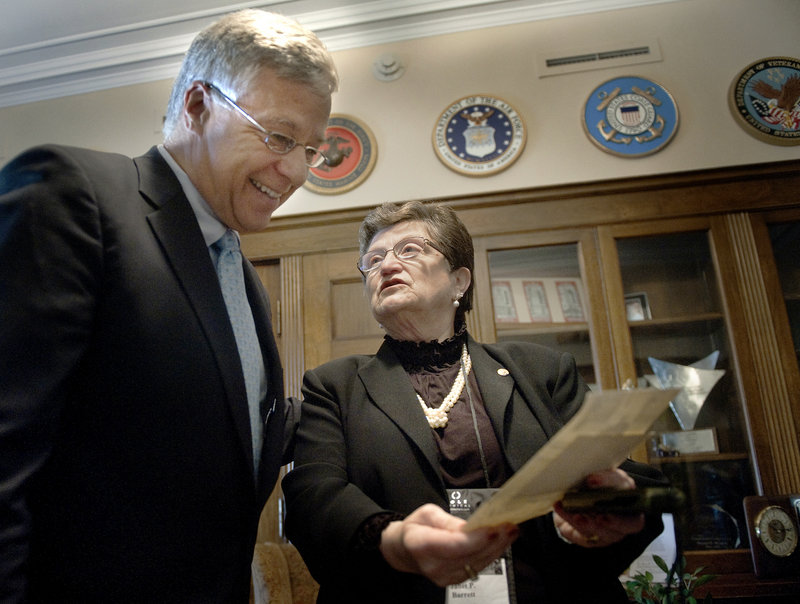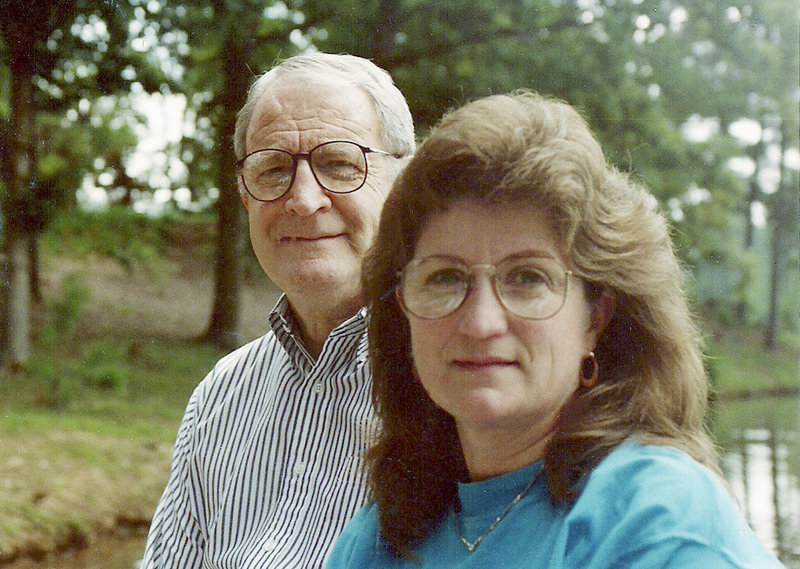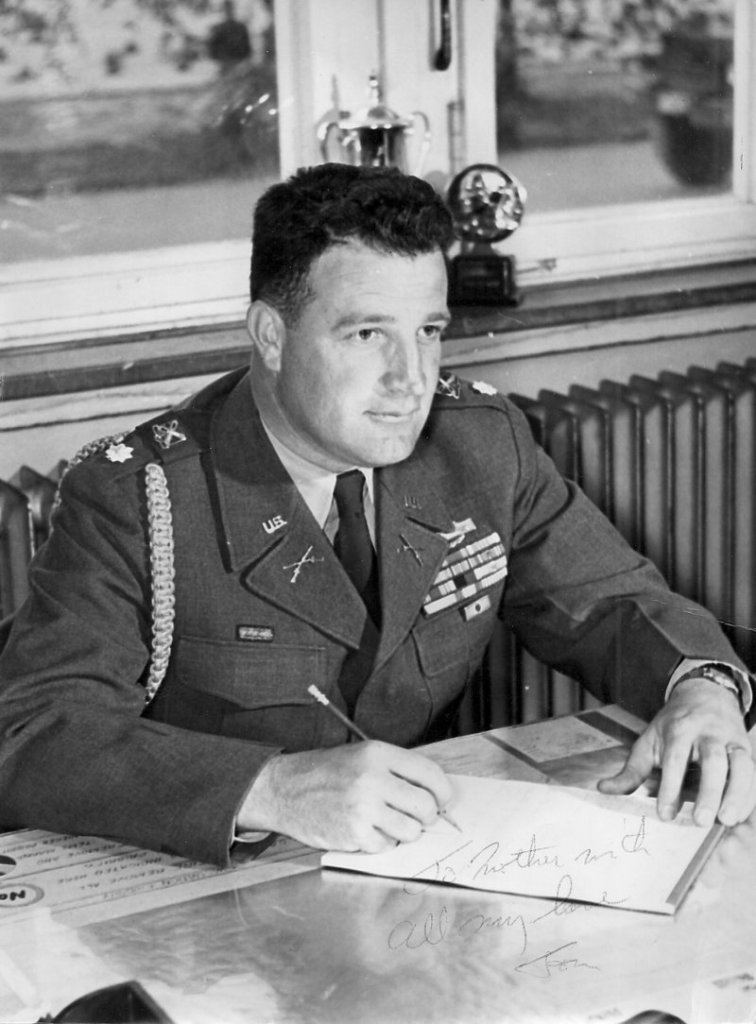WASHINGTON – It was the early dawn on July 11, 1944, near Pastena, Italy, when Lt. Thomas Plourde of Maine and his storied unit of Japanese-American soldiers came under heavy German artillery fire.
As the shells poured in on their position, Plourde and his men moved to better cover, but Plourde “risked his own life” by returning to make sure everyone made it out, according to an account of the battle a few weeks later, when Plourde’s commanding officer recommended the Lewiston native be awarded a Bronze Star Medal for “heroic and meritorious” action.
The men Plourde led were Japanese-Americans who had to fight their own nation’s prejudice even as they sustained heavy losses in some of the bloodiest battles against the Germans.
To his daughter, Jan Barrett of Lewiston, Plourde was a gentle giant of a man who made clear his disdain for prejudice and discrimination. But he never talked about his exploits during World War II, when he was a Caucasian officer who helped lead a company in the famous 100th Infantry Battalion/442nd Regimental Combat Team.
Plourde died in 1992 at age 71, but his daughter was present Wednesday at a Capitol Hill ceremony where dozens of surviving veterans of those Japanese-American units – including U.S. Sen. Daniel Inouye, D-Hawaii – were presented with the Congressional Gold Medal, the highest civilian award given by Congress.
Barrett, 64, was among the hundreds of veterans and family members who attended the ceremony in Emancipation Hall in the Capitol Visitor Center. She sat next to U.S. Rep. Mike Michaud, D-2nd District, who earlier Wednesday officially entered her father’s accomplishments into the Congressional Record.
Plourde retired from the Army in the 1960s as a lieutenant colonel and went on to a career as a hospital industry executive in Georgia, where he helped pay for the college educations of several needy children from the region.
“Sitting in the middle of all of the veterans who were surviving veterans, it was so moving,” Barrett said after the ceremony. “It just brought me to tears a couple of times wishing my Dad could have been there. It’s heartbreaking to me that he couldn’t be here to receive this himself, but I was so proud to be here representing him.”
Barrett owns the Ware Street Inn in Lewiston and has served as a staffer to former Democratic Sens. Edmund Muskie and George Mitchell of Maine. She called Michaud her “hero” for the Congressional Record tribute and for helping her get a prime seat for the medal ceremony.
It was her father who “definitely was the hero,” Michaud told Barrett as she showed him photos of Plourde in uniform.
Thousands of Japanese-Americans – second-generation citizens known as nisei – were eager to fight for the United States even as many of their parents and other family members lived in internment camps, their loyalties questioned after the 1941 invasion of Pearl Harbor.
It took awhile for U.S. military officials to approve the segregated units of Japanese-American soldiers, but after the war, President Harry Truman reviewed the 442nd on the South Lawn of the White House and noted their thousands of medals, heavy casualties and other evidence of the valor displayed by the soldiers.
“You fought the enemy abroad and prejudice at home, and you won,” Truman told the soldiers.
Among their assignments were the rescue of a trapped Texas battalion in France and the breaking of the “Gothic Line” in Italy that had succeeded in holding off Allied forces for five months, according to a history compiled by the National Veterans Network, a coalition of Japanese-American veteran and civic organizations.
Plourde, the 23-year-old “French-Canadian kid” from Lewiston, as his daughter called him, won more plaudits in 1945 from a company commander for what he and his men accomplished during mountain fighting that preceded the sweep of battalion forces into the Po Valley in Italy.
At one point, during a battle raging at Fort Bastione, “despite the heavy enemy fire, (Plourde) maintained that all-important post day and night to direct accurate counterfire upon the enemy gun positions,” his commander wrote.
“All throughout this period, his alertness and ability repeatedly paved the way for the battalion’s advance and the complete defeat of the enemy forces in this area,” wrote Maj. Mitsuyoshi Fukuda, a commanding infantry officer, in his statement from Sept. 7, 1945. “In these actions he (Plourde) proved his ability as a leader, demonstrating always personal concern for his men. For these qualities he received in return, the fullest cooperation from those who served under him.”
Barrett said that she was amazed when she looked through her father’s military records and realized what her father had done during the war and the historic combat unit he helped lead.
“They were an amazing battalion, and I am proud that my Dad was one of their officers,” Barrett said. “It just validates the feelings I always had about him.”
MaineToday Media Washington Bureau Chief Jonathan Riskind can be contacted at 791-6280 or at:
jriskind@mainetoday.com
Twitter: Twitter.com/MaineTodayDC.
Send questions/comments to the editors.






Success. Please wait for the page to reload. If the page does not reload within 5 seconds, please refresh the page.
Enter your email and password to access comments.
Hi, to comment on stories you must . This profile is in addition to your subscription and website login.
Already have a commenting profile? .
Invalid username/password.
Please check your email to confirm and complete your registration.
Only subscribers are eligible to post comments. Please subscribe or login first for digital access. Here’s why.
Use the form below to reset your password. When you've submitted your account email, we will send an email with a reset code.